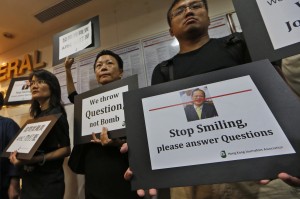Immigration confirms blacklisting of foreign journalists

Members of Hong Kong Journalists Association hold placards during a protest at the Philippines Consulate in Hong Kong, Tuesday, Oct. 8, 2013. The association is protesting the treatment of Hong Kong reporters covering a regional economic summit in Indonesia, saying they were treated like a serious security threat by the organizers who barred them from the event after they shouted questions at Philippine President Benigno Aquino III, who was only willing to convey an expression of regret but not the apology that Hong Kong Chief Executive Leung Chunying wanted. AP PHOTO/KIN CHEUNG
MANILA, Philippines —The Bureau of Immigration confirmed Saturday it has banned nine foreign journalists from the country for heckling President Benigno Aquino III in Indonesia last year.
In a statement, bureau spokesperson Elaine Tan said the journalists were blacklisted on the recommendation of the National Intelligence Coordinating Agency for “acts committed against the President during a summit in Bali, Indonesia.”
“Following normal protocol, the endorsement by NICA resulted to [the] issuance of a blacklist order against the identified foreign nationals,” said Tan.
She did not identify the journalists who have been on the agency’s blacklist since June as undesirable aliens.
The nine journalists apparently shouted questions at President Aquino during the APEC summit in Bali, Indonesia, a year ago. They had yelled questions at Aquino regarding the 2010 hostage crisis in Manila, which led to the death of eight Hong Kong residents.
Tan clarified the immigration bureau’s procedures on blacklisting of foreign nationals who are out of the country.
She cited Memorandum Order No. ADD-01-005 dated March 29, 2001 which lists down grounds upon which foreign nationals may be excluded or disallowed entry to the country.
One of the grounds, anchored on the interest of public safety, is when a foreign national shows disrespect or makes offensive utterances to symbols of Philippine authority.
Information on a foreign national is gathered by the BI through various sources, including the NICA, Department of Foreign Affairs, Department of Labor and Employment, and Philippine Drug Enforcement Agency, whose assessment is given much weight as they are considered to be in a better position to verify the information.
“We have close coordination with local law enforcement agencies and counterparts abroad to ensure that no undesirable foreign national enters, or remains in the country, as the case may be,” she said.
Tan said the rule is that a foreign national deemed to be undesirable while he is in the country is charged for deportation; if he is outside, he is simply placed on the blacklist.
“The rationale is that the subject is a threat to public safety and blacklisting minimizes that risk,” Tan said.
A person who has been included on the blacklist may, however, contest the fact by filing a request with the Commissioner of Immigration.
“If he submits sufficient proof to reverse the blacklist, it may be lifted accordingly,” Tan said.
RELATED STORY
Palace denies blacklisting of HK journalists
Regret, yes, PH apology, no; HK case unresolved